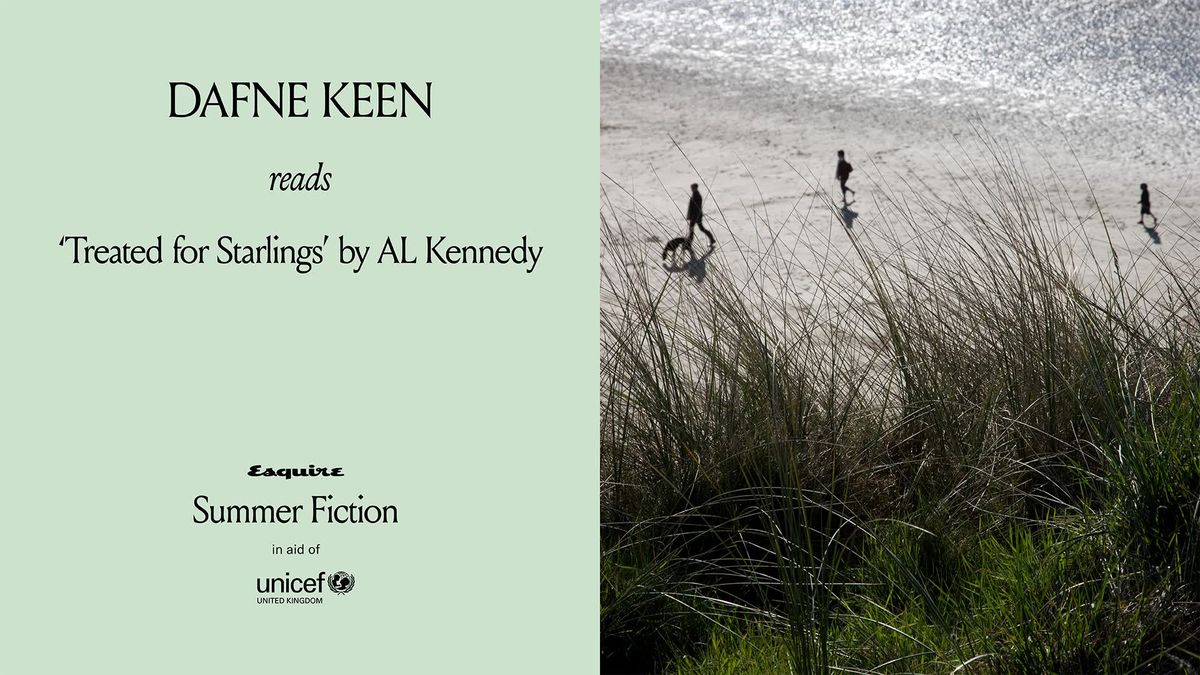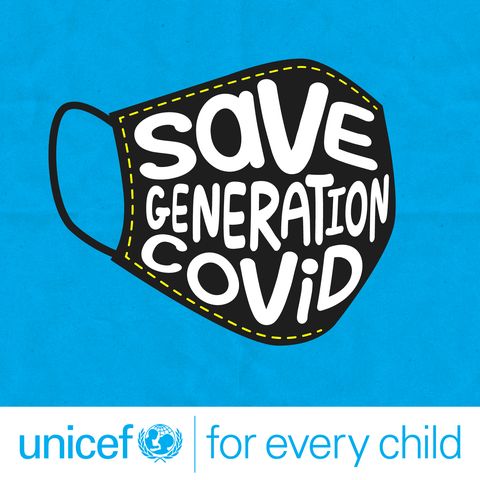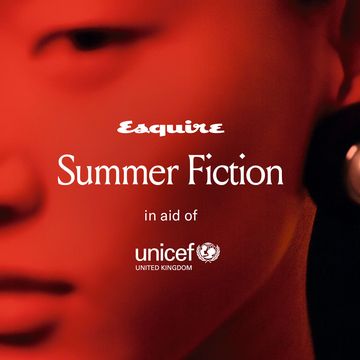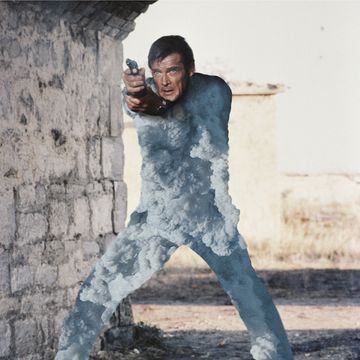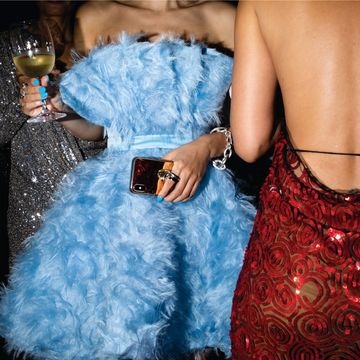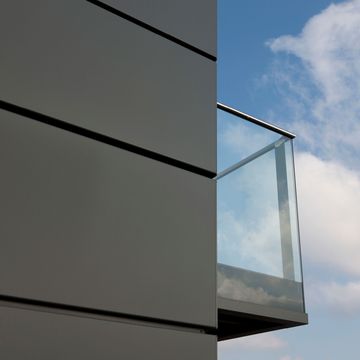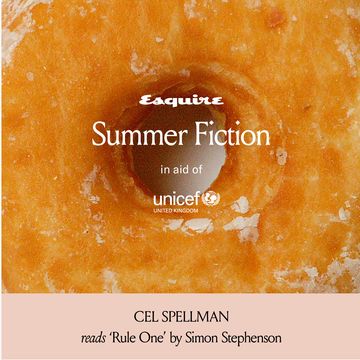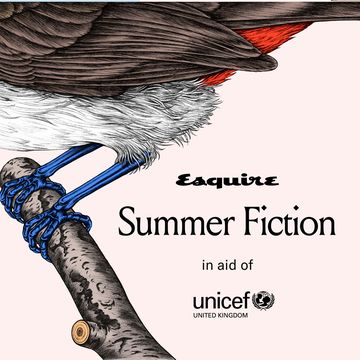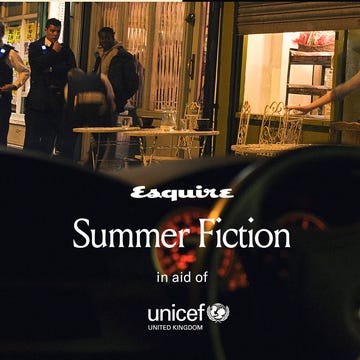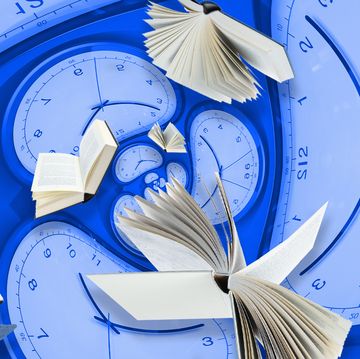Esquire's Summer Fiction series, in aid of Unicef UK, brings together some of the world's finest writers, and greatest actors, for a collection of original stories and readings that offer, we hope, a ray of light in these dark times, as well as the chance to raise funds for Unicef's Generation Covid campaign. (Read Unicef ambassador and Esquire editor-at-large Andrew O'Hagan's piece on why the campaign is so vital here).
Where a child is already experiencing hardship, outbreaks of diseases bring a new emergency to an already precarious situation. This is the story of Generation Covid. For vulnerable children all over the world, it poses the biggest threat since the Second World War. Please enjoy these stories, then visit Unicef UK's Generation Covid page to donate and hear a special message from Unicef UK Supporter Dafne Keen.
DONATE NOW
Audio: read by Dafne Keen
To listen, click 'Unmute' in the video at the top of this page. Alternatively, listen and download on Soundcloud, or listen on YouTube.
'Treated for Starlings' by AL Kennedy
There’s no such thing as grief.
Anne is trying to think. It being now this time of separation, she is walking east along the berm by herself and hoping to be peaceful, or close to it. Once she gets peaceful her head should clear. That would be normal.
It’s important that you set tasks for your day, so you can give yourself achievements. We agree on that.
She hasn’t spent this long with her husband in decades. When The Situation started, she’d mention this and meant her comments to be positive. They didn’t sound it. He probably felt the same, his own comments arriving with a sad voice and a happy face, or vice versa. They don’t talk about the issue any more. They don’t talk about much at all.
You set the tasks, only then you can’t complete them and your day goes all to shit. And that’s normal, too.
She no longer likes the word normal. It’s unreliable.
The sea air wrestles down the estuary here and punches and tugs: stings her face, even in the sunshine. She usually objects to the discomfort, but now it almost cancels out the punches and tugs of being tired-only-twitchy and blurry-but-alert. It’s like reality repeating itself, inside and out, harmonising.
But while she watches the sparks of water-light and understands they should be calming, she still can’t move through even a small idea from one end to the other. There’s this noise under everything.
And meanwhile, the spring is being violently healthy — strange, lush growth on every side — as if it wants to make a point about human weakness. The wild greens leaping up do console her. Anne really can’t manage without consolation. That’s why she’s here.
She speeds up as she turns inland and climbs the valley side. Sweating and labouring for breath are good in this context — intentional and clean. As the incline increases, the track ducks between hedges that reach for each other above her head. The air beneath has an animal scent, a damp and live heat.
This is an English type of countryside, but still familiar, life being borderless. Gorse bushes sag with blossom and touch her hair and set a muted taste of childhood on her tongue like a yellow wafer. One east coast recalls another.
I can enjoy this. On the House Schedule, we did put, or I put, someone put, Find Beauty And Appreciate It.
We were idiots at the start of this.
She knows better now.
You always expect too much of yourself and then you’re disappointing.
Slowly the route angles east again, beside woods.
Christ, everywhere does seem bloody gleeful to be without us. Undisturbed.
We’re a disturbing species.
The way her husband clears his throat might have been designed by a panel of experts on irritation.
We don’t have panels of experts, though, do we?
We have panels of clowns and the experts yell in through the windows.
The shade under the birches is luminous, almost painful, with bluebells and mounds of white campion. She could imagine that a dusk sky had been pulled down and laid underfoot. Such an ugly year, but there’s all this.
On impulse, she climbs over a low place in the wire fence, goes to stand in the dull hum of colour. But everywhere she steps, she ruins something and being here isn’t joyful — it’s beginning to make her dizzy, or sick, or depressed, or paranoid, or anxious to talk immediately about maybe these things and maybe others, so they can be real.
Maybe nothing is beautiful when you’re alone, because you need someone else to agree with you about it.
Is that co-dependency, or low self-esteem?
They’d made a project out of drawing a rainbow on some card they found while scouring yet another cupboard. Anne wasn’t sure if fixing it up in the living room window was useful, or pathetic.
It’s either pathetic or it’s art. You make that and put it in your sort of a window — that’s basically the process, isn’t it?
Jesus…
She strongly suspects she is herself pathetic. The Situation is making her transparent in the worst places.
But this is my chance to go online and learn about Pilates and Chi Gung and whatever should fix me; there’ll be stuff online, everything’s online, except for all the people who can’t afford it.
Anne hates on-screen chat. Her default expression is contempt, which she never knew before, or intended. But she has also never loved her computer more — for the little links to kindness and happy insanity — or mountain lions strolling in shopping malls, satisfying their curiosity. It offers her nicely trivial reasons to cry.
Maybe 1,000 people leaning in to pay attention add up to a conversation. You know something’s beautiful, but also you get to make sure. Like talking.
Of course, there’s no talking here. Somehow the trees and the brow of the hill are combining to kill her phone. This is to be expected. Everyone knows, the more needful your communication, the more inevitably it will fail. Normal.
At home, Anne and her husband now take part in mainly quiet activities, logically organised. They have that House Schedule taped up on the fridge door for reference. It was agreed they would need to add structure, now that days aren’t really days and last for months, or minutes, or skip and disappear. They play cards and wash objects and take turns to make soups out of the wide range of vegetables they buy randomly on mammoth shopping trips and then wash. Whatever they can’t abandon for three days, they wash. They’re dutiful and calming.
Washing raspberries in warm soapy water. That’s the last time we laughed.
They weren’t really vegetable people before, hadn’t even been aware of this particular lack.
Grown-ups eat vegetables, surely. Or grown-ups eat vegetables so that their children will.
She’s absolutely unable to remember meals they gave their son. They did look after him, his health, his safety. His hair like his father’s, paler at the end of summer, less red and more gold.
They still have two aubergines sitting in the kitchen, as baffling as ever. They’re a reproach. But nothing you can make with aubergines is a meal they want to eat.
Oh, but curry.
I did find an aubergine curry. Then I forgot.
We like curry.
I’ll have to not forget.
Her lists of problems and their remedies sometimes harass her and sometimes vaporise without warning. Or connect to little scenes that make her flinch.
The week it all started, an old man was in the Co-op, no one I’d noticed before.
The man had been looking for milk and plainly operating under the weight of feeling stupid and believing he was doing something wrong, because he couldn’t find the milk and he was puzzling up and down the aisles as if they were a question he couldn’t answer and searching mostly empty shelves in aisles where there’d never be milk. He had exhausted the naked white refrigerated places.
He wasn’t bad at shopping, there was just no milk, none at all.
Anne had asked him what was wrong, not sounding kind, because a shout has trouble sounding kind.
I probably didn’t look kind, but I did intend to.
She had explained that he could stop pacing and pacing with his little list and his empty basket, which was good news, but for a bad reason. No milk. This seemed to catch him like a blow. She tried not to understand that he was a man used to having a wife and was now having to remember that he missed her in new hard ways. The whole of his body made it obvious. Everyone has too much clarity now.
Anne found him things he could have in place of the things he wanted. Together they found the last can of powdered milk. He’d stared down at his items and then, as far as she could tell, clear through them into somewhere dreadful. After that he’d walked away like someone balancing along the top of a high, narrow wall.
I’ll put the aubergines in another soup.
Or in a curry.
We do like curry.
But soup would be easier.
Soups are cheap and they make you feel cared for — as if somewhere inside your house there is some other kitchen which holds your mum and dinner cooking for your not-gone-wrong-yet self.
Anne suffers spasms of longing for food they never did eat when she was a child, specialities of the region: macaroni pies and butteries and tattie scones — all the dead white starch and salt of home. She was encouraging nostalgia for a hard-boned, narrow, north-eastern Scottish town, because nostalgia for January in their own living room with all the colours turned up properly and nothing already gone wrong would be unbearable.
I want all the cupboards to be filthy chaos. I want to buy more light bulbs every time, because I can’t find the bloody light bulbs we’ve already got.
Fuck opportunities to be tidy.
She and her husband are cooking more without completely knowing why. It seems sensible but happened automatically. The chopping and the tasting and the setting down of laden plates makes them feel happier and more resourceful. There are many other things they can’t manage as their concentration blows away.
They have both shifted to working from home, but on fewer days — feeding information into hungry London, the city that drew them both south. Leaving again had seemed like a defeat, London being the mark of success — successful crowds, successful hurry, successful begging, successful tunnels, successfully bitter and metallic air. They’re only 50 miles away, an hour’s commute — which now seems like a threat.
God help the cities. God help them all. We were never really lucky before this.
Anne is aware that the emails she sends contain bizarre, but unavoidable mistakes. Business messages get tangled up with health-related wishes and enquiries which are unprofessional and intolerable and something she seeks out. She suspects that every document she files is of deeply inferior quality, but is being accepted by people unable to notice, lost in their own bizarre but unavoidable mistakes.
Anne and her husband have tried reading. They own books and they can look at them, but apparently all of their pages have been moved further away and their meanings don’t stick.
There’s only so long you can stare at a sentence.
Their TV is like a window into fast, loud places which aren’t the right depth. It’s hard to get involved with the layers of doing and shouting that slide by, or the faces that address them and recite slippy little new legends about darkness, ones that never mention the dark.
As if they shove their heads right through and into your room and then puke.
It’s better to mute the sound and watch the mouths, the eyes, the ticks of fear, flickers of absence, ignorance, hatred, outraged majesty, absence, anger, glee, absence, appetite, more absence.
I only have Resting Contempt Face — and I don’t mean it.
On the House Schedule, they mark the daily fall of darkness for the week. They make observations of the night sky. Her husband even started a list of targets: Venus, satellites, meteor showers, the Pink Moon between opaled clouds. It’s lost somewhere, so they can’t cross things off any more.
After standing in the echoes of the empty street — looking up, looking up — they watch favourite films: nothing untested that might be stressful, only trustworthy old companions. Her husband turns on foreign-language subtitles for stimulation and added value. He’s a man who likes to make improvements. Anne has only retained random pieces of other countries’ swearing.
While the plots unfurl, she has her sewing with her — masks. If the dramas get too dramatic her output soars. She has a low tolerance for emotion.
Anne is aware that she and her husband are washing away the enjoyment from movies that once were their friends. Cary Grant is becoming pointless. Each performer she loves is suddenly trying too hard. Anne has decided she’ll never suggest either Bogart, or Bacall. She’s keeping them safely away from all this.
So I don’t know when I’ll see them again.
Last night, Anne nominated a French film she has always pretended to like, because everyone talked about it when she was a student. Her husband bought it for her three or four Christmases ago, and she hooked it out from a dustless shelf in a perfectly organised cupboard. It was still sealed in its unecological cellophane, which isn’t necessary because why would you wrap up a CD as if it were biscuits and might go stale?
We need biscuits.
No, we don’t need biscuits. They would make us fat.
We need more biscuits for the food bank.
And for Mrs Archer — make her smile.
What kind of life means a packet of biscuits makes you smile?
The film was terrible, truly awful. All this time — 30 years — she’s been saying it’s a favourite. It was meant to be proof that Anne is fully functional, a going concern. Any adult should be able to have a favourite French film. She’s a person and has a right to access culture.
Tribes at the end of their tether survive if they can save their elders and their culture. We’ve run clear off our tether, but we’re all supposed to hate and pity both.
Anne’s walks are supposed to be restoring, so she tries to remember anything she likes.
Buster Keaton. The films of Buster Keaton.
She shares him with the unknown people who also enjoy Keaton and therefore must be like her and potentially friends. It’s good to feel that unknown people might be on your side.
But then I screw it up. I pretend to be an unknown person and nothing I say that I’m fond of is a good fit.
All this time — it is about 30 years — she’s been happily claiming a movie that’s proof she’s a bit off her head: pretentious, lying, unimpressive, weak; and therefore like the known and unknown people who aren’t helpful.
Halfway through watching the French abomination, they were both on their phones. Distractions have to be exceptional to stop them checking for the next disasters.
Againandagainandagain.
Anne didn’t admit she’d been wrong, made a wrong choice.
I was embarrassed.
None of her character flaws are dramatic, but they add up to someone she can’t like. Embarrassment seemed a disgustingly petty emotion to entertain in The Situation.
Her husband didn’t say a thing about it, which was probably kind of him. Kind man. At the moment, he spends an hour each morning doing press-ups and sit-ups, timed rests and repetitions. He aims to meet the standards of the United States Marine Corps Physical Fitness Test, which is something he came across online.
Goals are useful.
The PFT has a distance-running component, but he beats up and down their stairs to fulfil it, rather than go outside. He has noticed that running past people alarms them. He is considerate like that.
And Anne has her long, careful walks. They are the equivalent of several biscuits.
Exercise supports both health and emotional resilience.
She is rounding the last of the wood and heading back towards the water when the kestrel stops her. It’s nailed in the sky with this kind of authority over her route. Reed tops and branches are swinging, long grasses are being pushed down into roiling waves, but the bird is still. Its whole body is watching, an absolute.
Then it throws itself out of the air, drops hard. Anne’s stomach lurches with fresh vertigo, or anxiety, or joy, or triumph, or some other word for some other emotion. When the kestrel lifts again and turns, its wings gleam almost red. Then it flies from her, dipping its head and tearing at a small shape, held in one talon.
She is glad — we all have to eat — but also, she feels the touch of something hard at the back of her neck, quick and then gone. And probably she is crying. That seems fairly certain. Fourth time today. Various reasons.
She jog-trots to the point where the path makes a kind of shrug and rejoins the berm, looking out across the wet skin of the mudflats, the bones of abandoned boats, worn to needle points. Her phone always has reception here, exactly here, where she stands and calls Bill, looks over the creek at that church tower and calls Bill.
She is aware this is a remarkably stupid idea. When you’re trying to survive, though, you do whatever’s necessary. Talking is necessary.
“Anne.” He answers before she expects it and kicks at her pulse. This is her name but with another taste, the one that he adds. “I was waiting.” This is the sound of how long he’s lived and whether he is smiling.
She feels he might be smiling.
“Am I late? You sound sleepy, did I wake you up? Am I late, though?”
“Maybe — maybe you’re late, not maybe I’m sleepy — I mean, I don’t know the time. I’ve lost my watch somewhere. Are you OK?”
Everyone keeps asking everyone if they’re OK.
She’s leaning her back to the wind, his voice held in the shelter of both hands.
“Are you? OK?”
“I’m not bad.” She came five or six miles out to do this and now all she’s got is small talk. “I’m… it’s very beautiful out here.” But the details of her walk fragment and she can’t describe them. She might almost have dreamed the journey and still be at home — where she can’t talk.
With so much weather going on it’s not easy to tell, but Anne believes she hears his breath become a sigh. If they were resting, please, just at peace together, please, on the bed, hip against hip, then a sigh would shift their touch in closer.
I do love the people I love. You’re meant to do that. You’re meant to follow along behind that and be protected because you are doing what is right.
Apparently, she is sobbing. Anne pulls out a tissue and wipes her eyes, her nose, this making her gloves condemned things that she will throw directly into the wash and this also making the tissue a terrible object. It’s very tiring, the essential constant wariness.
I want a day when one thing that matters gets better instead of worse, instead of broken, instead of vandalised.
A proper cry is supposed to do you good.
Anne clears her throat.
You can’t say I’m not a trier.
But before she can speak, he starts, “My dad used to tell me, when someone was ill and he didn’t know the details — ‘Oh, she’s being treated for starlings. He’s under the doctor — treated for starlings.’ It was his joke. I was only wee and thought it was like mumps, or chickenpox — a chicken is a bird — I thought you could catch starlings.” He pauses to let her join in, but she’s looking at the red inside her eyelids and failing to picture his face. She holds on to the story.
“In the end I found out — it was an architectural thing, a City Corporation thing — they had too many starlings, so they got rid of them from buildings. I don’t know if that meant clearing nests and filling gaps, or installing nets and spikes and such. I hope it was only that. You’d have your office block or your tenement treated for starlings. That was the term.”
He stops again. Anne lets him. She’s imagining red sandstone and high, narrow windows and sunsets boiling at the foot of the Byres Road. Glasgow, the city of arts and of crafts — every evening waking what’s left of the stained glass in the porches.
When there’s trouble, you want to go home. Or you want to know that home is still all right.
And home can be the place where you first were content.
It can be the place that gave you people you could love.
“For years, I thought starlings was the worst thing you could catch.” He’s getting difficult to hear. “Dad got the mesothelioma from his work. Mum got it from his jacket and from carrying his shirt and overalls to the wash.”
Anne tells him, “I miss you.” She only ever seems to say that when he’s already preoccupied. She has bad timing.
Up in the Co-op where they all dance to keep their six-foot perimeters intact — these taut sections of air — she feels other shoppers notice her rhythm’s off.
She says, “I remember the starlings.” That isn’t a lie. Once, during her first year in Glasgow, she’d been slightly lost and had made for Central Station to start again. You can always start again from a known fixed point. She had been heading along Broomielaw, thought she was looking up at nothing but the girders and complications of the railway bridge. And then the mass of birds had risen from it, as if they’d been conjured from nowhere and were one thinking, twisting thing that reached out and flexed across the width of the skyline and made the noise of waterfalls. They blurred and flowed and scattered and then compacted, hung there like…
I don’t know.
It looked like a bad thing bound to happen. It looked like now.
There’s a too-long silence. Bill has no more words than she does. They have that in common. Then she hears his breath slip and press at the receiver between hurt sounds, tiny sounds. He is making lost child sounds and she can’t hold him.
“Bill?”
The phone rests against her cheek, a useless thing which is the opposite of touching. She wants the temperature of his hands and the way he’ll pause in doorways and not quite come in until she looks at him — as if that’s a necessary step. She wants.
“Bill? Bill?”
It’s like listening to a crying boy.
She hears herself ask him. “Should we maybe stop? Is that…? Maybe we shouldn’t keep doing this. Should we stop? Bill?”
A handful of oystercatchers startle and take flight, squealing — I plead, I plead, I plead, I plead. Whatever Bill says before he hangs up gets lost in the din.
Afterwards she stands for a long while. Time isn’t easy to judge any more, but when she takes the straight route home along the dyke she has to race the sunset.
So this took us hours — hours and hours.
At least it’s a good path. No one else on it this late.
It’s sensible to look for positives in every circumstance. The path is smooth going with excellent sightlines — no surprises — fine, whiteish gravel that shows her the way even when it’s really too dark to be out. There’s never any danger that she’ll stumble off the berm and down into the ditch, or the salt marsh. She stays, in that sense, safe.
And their house is still where she left it when she gets back and her key still fits the lock and there’s still the drawing of a rainbow in the living room window, faded slightly by the sun already so its colours are strange.
Her husband is in the kitchen peeling potatoes, although they have a soup made for tonight. It’s for the pensioners, perhaps. He likes to keep busy.
He has put on fresh jeans and the blue checked shirt, as if it is eight, 10 weeks ago, three months ago, last Christmas when they used to do all of that travelling, all of that meeting people and dressing up. His hair is too fine to be manageable when it’s over-long, but he has brushed it away from his forehead which means that he seems mildly biblical. He’s making moves towards being someone else, differently expressed.
“Hi, love.”
But he doesn’t look at her, keeps working, and so she goes and stands behind him, rests her forehead to touch his back, his breath, the space between his shoulder blades. His shirt smells of their English garden and his skin.
“The bluebells were…” She doesn’t get to finish, because he flinches and hisses in air through his teeth, pulls away.
“What’s the matter?”
Then he’s leaning at the sink and running the cold tap and blood and unstoppable blood is washing from the knuckle of the forefinger on his left hand.
The sight of him hurt swings the kitchen floor, just for a moment.
There are threads of red drifting across the white porcelain, curling as the water flows. The peeler has furrowed out a deep strip of flesh and why has she never noticed before what an obvious risk the blade is? The thing is lying abandoned on the counter, red and surgical.
Anne kisses his unharmed hand, “I’ll get the plasters. You keep going with that and it’ll stop bleeding and I’ll get the plasters. We have plasters. Poor boy. We’ll be all right.”
“Don’t go.”
So she doesn’t. Anne snugs her arm around his waist, feels panic in the muscles of his back. She returns his safe hand to her lips and shuts her eyes.
He mustn’t need stitches. We mustn’t have accidents that need stitches. We mustn’t have accidents.
A place at the back of her neck aches. It feels naked.
“Anne.”
“I’m not going.”
“Next time you walk, I’ll come with you.”
“OK.”
“We’ll do that, then.”
“OK.”
“We’ll do that.”
Her husband keeps bleeding as much as before. He turns his head and looks at her and seems beautiful like a sky poured under birches. The Situation is terrible, but it makes certain instants come clear — you find you can see reality flare up true and lovely. People often remark on this: how they are overwhelmed by the colour of an ordinary leaf, or an ordinary songbird’s melody. Things are becoming transcendent.
Or we’re desperate for transcendence, so we find it.
Anne has an ordinary transcendent husband.
She could almost whisper, because he’s so near — They say things are coming back, or coming in closer: wild boar and goats and pumas, whales, elephants. There have been sightings of pterosaurs. Flying pterosaurs on lizard wings; I don’t know what any of that could mean, except that maybe anything can change into anything else. Maybe we’ve earned the possibility of that.
But she tells her husband, “Bill, we’ll go and take the walks together and we won’t do the phone calls any more. If that’s what you want. Is that what you want?”
Both his hands lift as if he wants to smooth his hair, but then he remembers he can’t and pauses long enough for blood to trickle down over his wrist and his shirt cuff.
“Shit. It’ll stain.” He stares while the blood keeps on and the stain gets bigger.
“I’ll get the plasters.” But she doesn’t leave him, yet. “We’ll find out how to do this. We can be in the same house together and we can talk in the same house and we can be us. I like us. I like you.”
“You said you missed me.”
“That’s how I knew I shouldn’t be away.”
“We’re out of practice.”
“I know.”
“It’s a shitty time.”
“I know.”
And then they kiss and she remembers kissing him 20 years ago.
Things come back, they come closer.
I never knew that we were wildlife.
She doesn’t know they won’t frighten each other back into the woods.
They eat dinner later, gently, after they’ve patched up Bill’s hand and then they discover they’re both too tired to watch a film. She thinks it will be pleasant to have a long bath and then join her husband in their bed. They have a king size — more space. Not solitude, only harmless space.
The new silence outside is still shoving against their walls and window glass when she lies down and Bill turns out the light.
He moves to her and holds her as if they are both falling. “Sam called. He wanted to thank you for the jar of lemon curd.”
When you can’t be at home, you want to eat it.
Bill’s chest rises and something in the motion makes her know — here’s the dark on its way.
“He’s still in oncology. But they’ve got him on a ward with suspected infections. He goes to that ward. For suspected infections they don’t get the full kit. Only for the definite infections. That’s the protocol. What they have. That’s what they have.”
And she feels their bodies start the fall.
“I didn’t say anything.”
Everywhere people are not saying anything, because that is the only way they can save each other. At least don’t name it, at least don’t do that.
“I didn’t say anything.”
We’ll get kit, we’ll buy kit, we’ll find kit. There’s that charity. There’s a few — they sometimes have kit. We’ll have to get kit for all of them. Not fake kit. For all of them. If we’re allowed, which it has to be allowed, we have to be allowed. I’m not sure how long it takes to come. I’m not.
“He’s tired. He said that he was tired.”
“He’s working too hard.”
And Bill says. “I told him.” And both of them are falling so fast. “He sent his love.” And both of them sound like new people they don’t want to be, all the words they say ripped away in the dark, fast and faster.
“He’ll call again.”
“He’ll call again.”
They’re so fast they’re impossible.
And there’s this noise under everything, like thousands of waterfalls, thousands of wings, like machinery pressing breath into drowning lungs.
She’s trying not to think.
There’s no such thing as grief — there’s only love and fury. They make this one thing with this other name.
She holds her husband.
Please don’t take our son.
Please don’t take our son.
Please don’t take our son.
There’s nothing else.
AL Kennedy says:
“I have never written a short story in a week, but in those early days of lockdown when nothing seemed possible, it struck me that such times are also when everything becomes possible. Writing the piece seemed a small positive gesture to make while I sat safe at home and people risked their lives to keep me safe. Like everyone else, I was being swept by waves of dreamlike intensity and weird symbolism. It seemed I was walking through all manner of possible stories and that, if I said yes to the commission, I could use that.
"In terrible realities, a writer at least has a kind of right to reply, if not an obligation. So I spent seven days – and three nights – doing what I could at that time, besides trying to support people out in the world and helping. A short story can seem a useless thing, but it’s not nothing. Those of us reduced to tears, sustained, uplifted by art during the UK’s ongoing series of omnishambles know we need to see proofs of creation while we withstand destruction. If anything I write gets anyone through something I’m happy. The words of others get me through.”
This story appears in the July/August issue of Esquire.
SUBSCRIBE NOW
AL Kennedy is a writer and performer whose novels include Day and Paradise. She has twice been selected as one of Granta's Best of Young British Novelists and has won awards including the Somerset Maugham Award, the John Llewelyn Rhys Prize and the Costa Book of the Year. Her most recent collection of short stories, We Are Attempting to Survive Our Time, was published in April.
Dafne Keen is a British-Spanish actress who is known best for her role as Lyra Belacqua/Silvertongue in the BBC/HBO television series His Dark Materials. She first became involved with Unicef when she spoke at the UN on World Children’s Day in 2017, as part of the kids takeover of the UN. She has supported many of Unicef UK's campaigns since.
